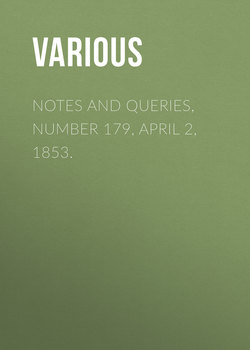Читать книгу Notes and Queries, Number 179, April 2, 1853. - Various - Страница 7
Notes
Minor Notes
ОглавлениеWhite Roses.—In an old newspaper, The Weekly Journal, or British Gazetteer, of Saturday, June 15, 1723, I find the following paragraph:
"Monday being the anniversary of the White Roses, some persons who had a mind to boast that they had bid defiance to the government, put them on early in the morning; but the mob not liking such doings, gathered about them, and demolished the wearers; which so terrified the crew, that not one of them afterwards would touch a white rose."
Can you, or any of your correspondents, explain this curious allusion? Is it to the emblem of the House of York, or the badge of the Pretender?
E. G. B.
Fifeshire Pronunciation.—I have observed, in various parts of Fifeshire, a singular peculiarity in the pronunciation of certain words, of which the following are specimens:
This strange mode is not altogether confined to the most illiterate portion of the people. My query is, Does this peculiarity obtain in any other portion of Scotland?
A. R. X.
Paisley.
Original Letter.—The following letter, written by the French general at Guadaloupe, when it was taken in 1810, to his conqueror, is an exquisite specimen of something more than that national politeness which does not desert a Frenchman even in misfortune. I possess the original:
Au quartier général du Parc,
le 6 Février, 1810.
A son Excellence
Le Général Beckwith, Commandant en chef les forces de sa Majesté Britannique aux isles du Vent.
Monsieur le Général,
J'ai été prévenu que Votre Excellence se proposait de venir au Parc demain dans la matinée. J'ose espérer qu'elle voudra bien me faire l'honneur d'accepter le diner que lui offre un Général malheureux et vaincu, mais qu'il présente de tout cœur.
Daignez, Monsieur le Général, agréer l'assurance de la haute considération avec laquelle
J'ai l'honneur d'être,
de votre Excellence,
Le très-obéissant serviteur,
Emouf.
Edward Foss.
Erroneous Forms of Speech.—Since you allow your correspondents to correct such words as teetotal, I hope you will allow me to call the attention of your agricultural readers to the corruption in the word mangold, as they now write it. The word is in German mangel wurzel, root of scarcity. It is wrong to use even such a name as this, in my opinion, while we have the English name beet, which has the additional advantage of being derived from the botanical name Beta. But if a new name must be used, let it, at any rate, be the pure German mangel, and not the mongrel mangold. Indeed, those who spell the word in the latter way, ought in common consistency to write reddishes, sparrowgrass, and cowcumbers for radishes, asparagus, and cucumbers.
E. G. R.
